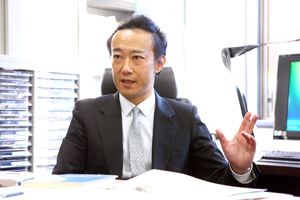2010/06/02
Paving the way for information-theoretic machine learning and data mining with “Latent Dynamics”
Professor Kenji Yamanishi
(Department of Mathematical Informatics)

Professor Yamanishi is an expert on data mining. He proposed “information-theoretic machine learning and data mining” as an entirely new academic discipline and initiated the research to discover, through capturing changes and dynamics of information behind the data, valuable knowledge and information that were hidden before. The methodology called “Latent Dynamics” is positioned at its core. The goal is to capture signs of changes happening in the real world through this scientific view, such as detecting network anomaly, predictors of cyber criminality, and information regarding food safety.
Information-theoretic machine learning, which rests on data mining and on information-based induction sciences that extract (learn) the optimal mathematical model to explain a phenomenon, aims to apply valuable knowledge discovered from massive data to marketing, security, and risk management. An original learning methodology based on MDL (Minimum Description Length) that selects a model to properly explain a phenomenon with the shortest bit string has been used as the foundation of machine learning.
It is important to note that it focuses on latent information behind the data. It handles meta-level information that does not surface, such as the intention of a data operator and latent relationships, which change over time. Structural changes of information (Latent Dynamics) can be used to manage risks as in detecting unauthorized intrusion and unknown viruses and acquire important information that is essential for marketing as in identifying future trend changes from time-series data. Latent movements including product trends, consumption patterns, and rivalries can be analyzed by examining latent dynamics behind the consumer word-of-mouth information, “CGM (Consumer Generated Media).”
Professor Yamanishi who is a young and talented researcher holds the view that “mathematical engineering is scholarship closely tied to business” from his experiences including development of an original learning theory while working in the private sector and its application to data mining.

